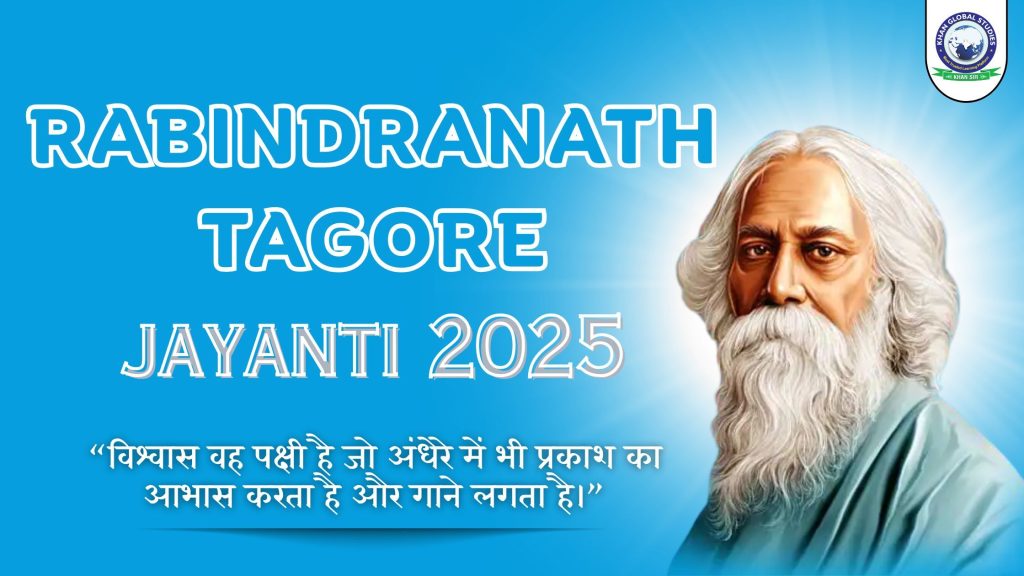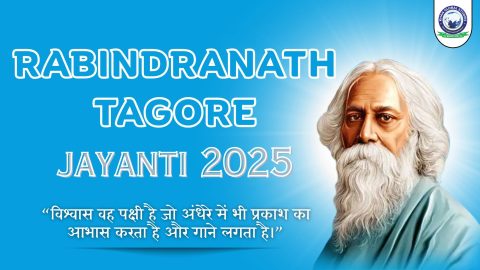Rabindranath Tagore, whom we also know as ‘Gurudev’, was not just a literary figure but the harbinger of a cultural renaissance. In 2025, his 164th birth anniversary will be celebrated on May 7, a moment to remember his life and contributions. In Bengal, this occasion is celebrated grandly as “Panchoshi Boishakh” on May 9, following the Bengali calendar date 25 Boishakh.
Rabindranath Tagore was a great Indian poet, writer, philosopher, musician, and educationist, who gave Indian culture a global identity. He was the first Asian to receive the Nobel Prize, and the author of India’s national anthem.
Early Life
Rabindranath Tagore was born on May 7, 1861, in a wealthy and culturally enriched Tagore family in Kolkata (then Calcutta). His father Debendranath Tagore was a leading thinker of the Brahmo Samaj. From childhood, Tagore was deeply creative, emotional, and naturally independent in temperament.
| Aspect | Details |
| Full Name | Rabindranath Tagore |
| Date of Birth | 7th May 1861 (Gregorian), 25th Boishakh 1268 (Bengali Calendar) |
| Birthplace | Jorasanko, Calcutta, British India |
| Parents | Debendranath Tagore & Sarada Devi |
| Education | Home tutored, briefly studied at University College London |
| Major Contributions | Literature, Music, Art, Education, Nationalism |
| Notable Works | Gitanjali, Gora, Ghare Baire, Kabuliwala |
| National Anthems | India (Jana Gana Mana), Bangladesh (Amar Shonar Bangla) |
| Awards | Nobel Prize in Literature (1913) |
| Date of Death | 7th August 1941 |
How Did “Thakur” Become “Tagore”?
Rabindranath’s original Bengali surname was “Thakur” (ঠাকুর). The British attempted to transliterate Bengali names in their own style, resulting in the name “Tagore”. Since the English language lacks the “ठ” sound, they pronounced it with a “T”, leading to the anglicized version “Tagore”. This version became his global identity over time.
Education
Tagore never liked the conventional education system. He received most of his early education at home. Later, he went to England for higher studies and joined University College London to study law. However, he returned to India without completing his degree, as his inclination was more toward literature and art.
Nobel Prize
In 1913, Tagore received the Nobel Prize in Literature for his poetry collection “Gitanjali”. He became the first Asian to receive a Nobel Prize, which brought international recognition to Indian literature.
Composer of National Anthems
Tagore authored the national anthem of India – “Jana Gana Mana”, and that of Bangladesh – “Amar Shonar Bangla”. He is the only literary figure to have composed the national anthems of two countries.
Contribution to Education: Planting the Seeds of a New Thought
Tagore believed that education is not merely the transmission of knowledge but the expression of the soul. In 1921, he established Visva-Bharati University at Santiniketan, promoting open, nature-aligned, and creative learning. He criticized rote learning and redefined education as free, artistic, and humanistic.
Ideological Leader of the Freedom Struggle
Although Tagore did not actively participate in political movements, his thoughts and writings provided ideological support to India’s independence movement. In 1919, he returned the knighthood awarded by the British in protest against the Jallianwala Bagh massacre. He supported the Swadeshi Movement and linked self-reliance with national identity.
Immortal Contributions to Literature and Art
Tagore’s literary world was vast and diverse. His works are rich with social sensitivity, humanity, and spiritual depth.
Major Works:
- Poetry Collections: Gitanjali, Sonar Tori, Manasi, Balaka
- Novels: Gora, Ghare-Baire (The Home and the World), Chokher Bali, Noukadubi
- Short Stories: Kabuliwala, Postmaster, Atithi, Kshudhita Pashan
- Plays: Dak Ghar, Chitrangada, Chandalika, Visarjan
- Music: Over 2,000 songs (collectively known as Rabindra Sangeet)
Famous Quotes by Rabindranath Tagore
- “Faith is the bird that feels the light and sings while the dawn is still dark.”
- “You can’t cross the sea merely by standing and staring at the water.”
- “I slept and dreamt that life was joy. I awoke and saw that life was service. I acted, and behold, service was joy.”
Demise
Rabindranath Tagore passed away on August 7, 1941, in Kolkata. He left behind a legacy in literature, music, philosophy, and education, which continues to guide humanity through generations.
Conclusion: The Legacy of Gurudev
Rabindranath Tagore Jayanti is not merely a birthday celebration; it is a remembrance of a consciousness—a convergence of literature, education, patriotism, and humanity. His thoughts continue to inspire India and the world toward moral vision, cultural richness, and creative freedom.





